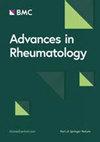2023 巴西风湿病学会系统性硬化症治疗指南
IF 2
4区 医学
Q3 RHEUMATOLOGY
引用次数: 0
摘要
系统性硬化症(SSc)是一种罕见的慢性自身免疫性疾病,表现多种多样。在过去十年中,已经开展了多项临床试验,以评估治疗系统性硬化症的新方案。这项工作的目的是根据现有的 SSc 药物治疗新证据,更新巴西风湿病学会的建议。根据 "患者/人群、干预、比较和结果"(PICO)策略,对预先确定的问题进行了系统回顾,包括随机临床试验(RCT)。根据建议评估、发展和评价分级(GRADE)方法对现有证据进行了分级。要成为一项建议,至少需要 75% 的投票小组同意。根据现有的 RCT 结果,就雷诺现象的药物治疗、治疗(愈合)和预防 SSc 患者的数字溃疡、皮肤受累、间质性肺病(ILD)和胃肠道受累制定了六项建议。利妥昔单抗等新药被列为皮肤受累的治疗方案,利妥昔单抗、托珠单抗和宁替尼被列为间质性肺病的治疗方案。硬皮病肾危象和肌肉骨骼受累的药物治疗建议是在投票小组专家意见的基础上制定的,因为没有发现安慰剂对照RCT。这些指南根据有关 SSc 的文献证据和专家意见,更新并纳入了治疗 SSc 的新治疗方案,为临床实践中的决策提供了支持。本文章由计算机程序翻译,如有差异,请以英文原文为准。
2023 Brazilian Society of Rheumatology guidelines for the treatment of systemic sclerosis
Systemic sclerosis (SSc) is a rare chronic autoimmune disease with heterogeneous manifestations. In the last decade, several clinical trials have been conducted to evaluate new treatment options for SSc. The purpose of this work is to update the recommendations of the Brazilian Society of Rheumatology in light of the new evidence available for the pharmacological management of SSc. A systematic review including randomized clinical trials (RCTs) for predefined questions that were elaborated according to the Patient/Population, Intervention, Comparison, and Outcomes (PICO) strategy was conducted. The rating of the available evidence was performed according to the Grading of Recommendations Assessment, Development and Evaluation (GRADE) methodology. To become a recommendation, at least 75% agreement of the voting panel was needed. Six recommendations were elaborated regarding the pharmacological treatment of Raynaud’s phenomenon, the treatment (healing) and prevention of digital ulcers, skin involvement, interstitial lung disease (ILD) and gastrointestinal involvement in SSc patients based on results available from RCTs. New drugs, such as rituximab, were included as therapeutic options for skin involvement, and rituximab, tocilizumab and nintedanib were included as therapeutic options for ILD. Recommendations for the pharmacological treatment of scleroderma renal crisis and musculoskeletal involvement were elaborated based on the expert opinion of the voting panel, as no placebo-controlled RCTs were found. These guidelines updated and incorporated new treatment options for the management of SSc based on evidence from the literature and expert opinion regarding SSc, providing support for decision-making in clinical practice.
求助全文
通过发布文献求助,成功后即可免费获取论文全文。
去求助
来源期刊

Advances in Rheumatology
Medicine-Rheumatology
CiteScore
4.00
自引率
4.30%
发文量
41
审稿时长
53 weeks
期刊介绍:
Formerly named Revista Brasileira de Reumatologia, the journal is celebrating its 60th year of publication.
Advances in Rheumatology is an international, open access journal publishing pre-clinical, translational and clinical studies on all aspects of paediatric and adult rheumatic diseases, including degenerative, inflammatory and autoimmune conditions. The journal is the official publication of the Brazilian Society of Rheumatology and welcomes original research (including systematic reviews and meta-analyses), literature reviews, guidelines and letters arising from published material.
 求助内容:
求助内容: 应助结果提醒方式:
应助结果提醒方式:


